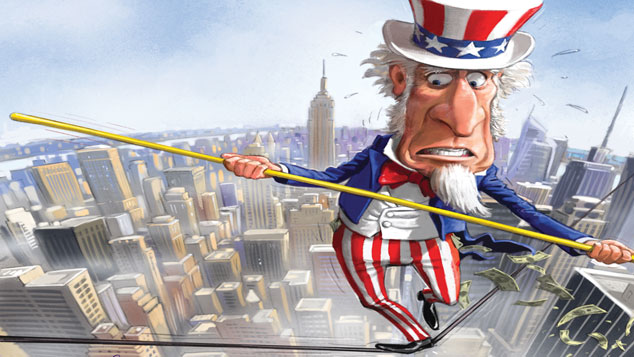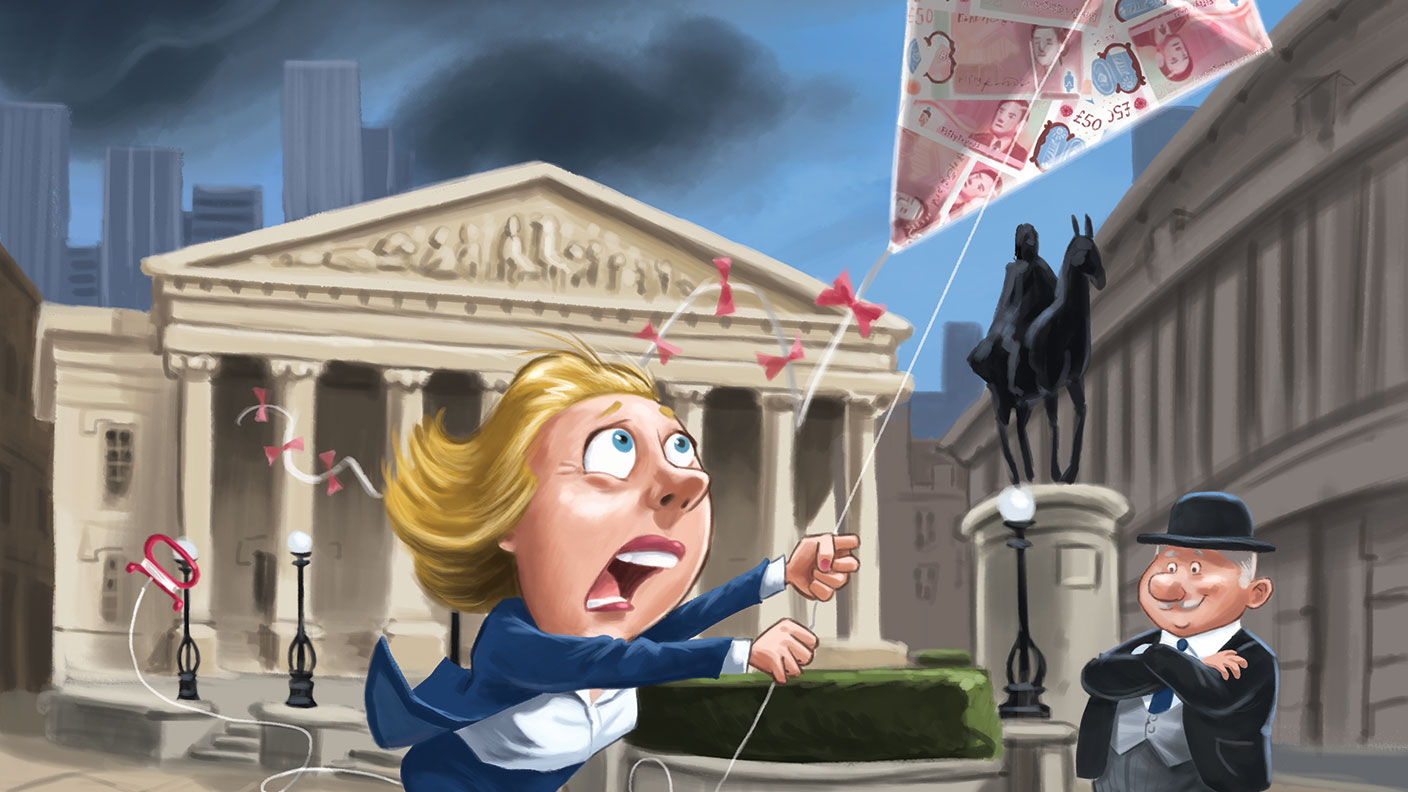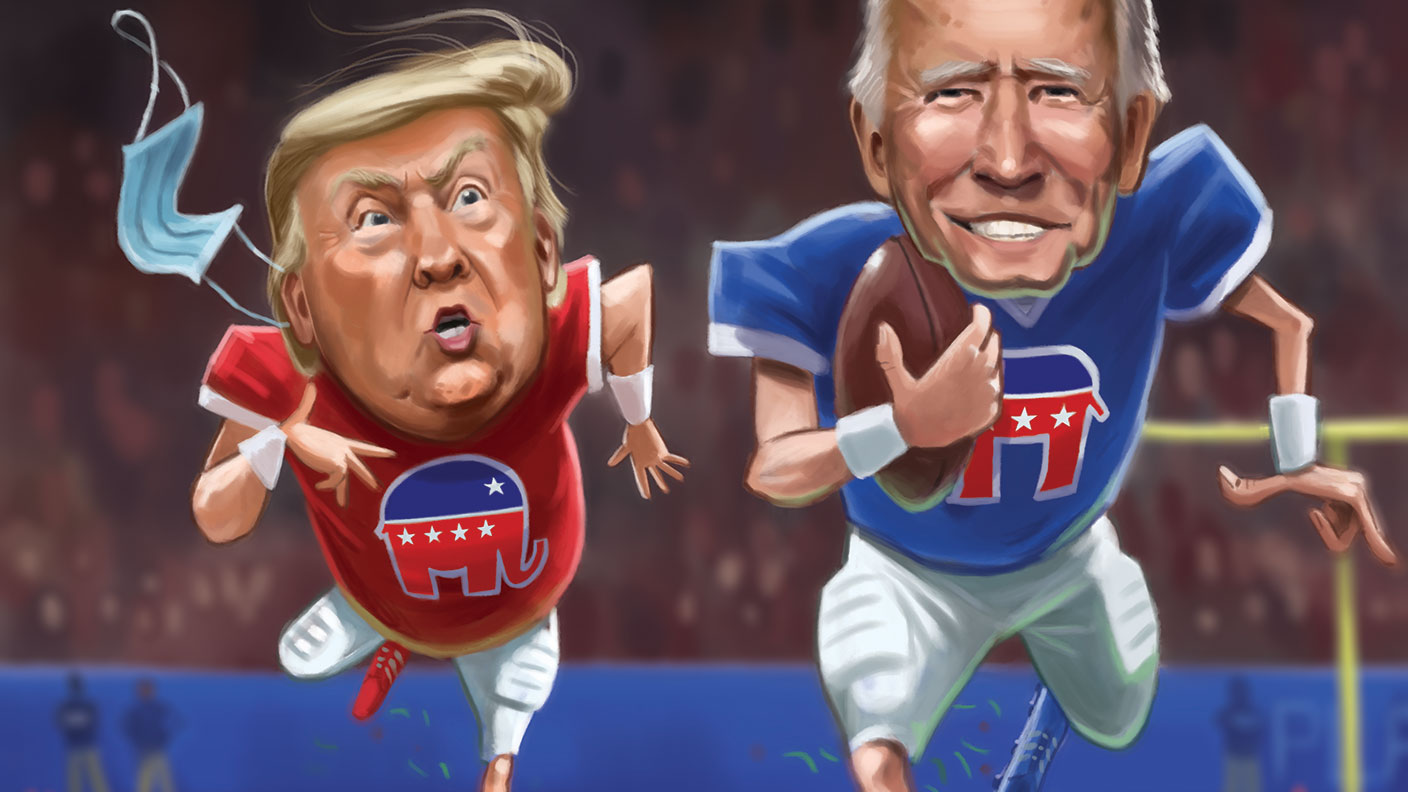US election 2016: America walks a tightrope
The US election cycle kicked off this week – and the results are unpredictable. Matthew Partridge considers how this might affect your investments.

Get the latest financial news, insights and expert analysis from our award-winning MoneyWeek team, to help you understand what really matters when it comes to your finances.
You are now subscribed
Your newsletter sign-up was successful
Want to add more newsletters?

Twice daily
MoneyWeek
Get the latest financial news, insights and expert analysis from our award-winning MoneyWeek team, to help you understand what really matters when it comes to your finances.

Four times a week
Look After My Bills
Sign up to our free money-saving newsletter, filled with the latest news and expert advice to help you find the best tips and deals for managing your bills. Start saving today!

The US election cycle kicked off this week and the results are unpredictable.Matthew Partridge considers how this might affect your investments.
Six months ago everyone thought this year's American election would be predictable. Everyone thought Hillary Clinton would easily win the Democratic nomination, while Jeb Bush would end up representing the Republicans. They would, of course, disagree on lots of things but there would be a basic consensus on the economy. Not any more. Bush has faded away, replaced by Donald Trump andTed Cruz, both of whom are far to the right of the Republican mainstream.
On the Democrat side, the socialist Bernie Sanders has emerged from nowhere to challenge Clinton. Suddenly, "business as usual" doesn't look quite as assured as it once did. This is why you need to know what's going on and how the ups and downs of the US electoral cycle could affect your money.
MoneyWeek
Subscribe to MoneyWeek today and get your first six magazine issues absolutely FREE

Sign up to Money Morning
Don't miss the latest investment and personal finances news, market analysis, plus money-saving tips with our free twice-daily newsletter
Don't miss the latest investment and personal finances news, market analysis, plus money-saving tips with our free twice-daily newsletter
How the process works
There are essentially two phases.For the next six months, both partieswill be selecting delegates to their respective national conventions, which will formally select their presidential candidates in the second half of July. Some senior party figures are automatically entitled to be delegates and are free to vote for whichever candidate they choose. But most delegates are elected in a series of primaries and caucuses (the main difference between a primary and a caucus is the voting method used). These began with Iowa last Monday, which Clinton took for the Democrats and Cruz for the Republicans.
In past contests one candidate has quickly built up an unstoppable momentum, resulting in the contest being effectively over as early as just after "Super Tuesday" (so-called because several states cast their votes simultaneously), which falls on 1 March this year. However, it doesn't always pan out like this.
For example, in 2008 the contest for the Democratic nomination took far longer than anyone expected. Clinton only bowed out in June, leaving the field to Barack Obama. Meanwhile, on the Republican side this year there's a distinct possibility that no single candidate manages to win the majority of delegates. That would leave the nomination to be decided by horse-trading at the convention in summer.
Once the candidates are selected, the nominees will face each other over a three-and-a-half-month campaign, culminating in the general election on8 November. Presidential candidates are elected via the 538-member electoral college, with the winner of each state being awarded a set number of electoral votes depending on the population of the state (Washington DC is not a state, but it does have one electoral vote). In a close election the winner of the popular vote may not be the candidate who ends up as president (as was the case in Al Gore versus George W. Bush in 2000).
More to the Republicans than Trump
The headline-grabbing story of the campaign so far has been the rise of the casino and real-estate mogul Donald Trump. Trump's populist campaign is focused on immigration. He has talked of deporting illegal immigrants, building a wall (funded by Mexico) across the 2,000-mile US-Mexico border, halting Muslim immigration to America, and has made various other inflammatory statements about other minority groups. He has a similarly populist approach to trade.
In recent decades, Republicans have been fairly supportive of free trade, even working with President Obama to drive forward the Trans Pacific Partnership (TPP), a US-Asia trade deal, in the face of opposition from his own party. However, Trump not only opposes this and other free-trade agreements, but has also called for the US to impose large punitive tariffs on China to protect manufacturing jobs. The likelihood of this triggering a damaging trade war potentially similar to the depression era doesn't seem to trouble him.
Trump placed second in Iowa and this has clearly damaged him, especially given that the final polls had put him ahead and pundits had started to take his chances seriously. However, it would be foolish to write Trump off his net worth of $3.7bn gives him plenty of campaign funds and he is polling well in the key state of New Hampshire, due to vote this week. Even so, it shows he has limited support with Evangelical Christian voters, a key Republican constituency.
Even if he bounces back, the reality is that his extreme views are off-putting to many voters around 55% of Americans view him unfavourably. So as the field narrows, voters might vote tactically to prevent him winning. As a result, the odds of Trump winning the nomination on betting exchange Betfair have halved from around 50% before Monday's vote to just over 25% now.
By contrast, Cruz's unexpected victory, due to his close targeting of voters and strong organisation, has boosted his campaign. Cruz has been perceived as a slightly more moderate (ie, electable) version of Trump. Although Hispanic, Cruz shares many of Trump's hardline views on immigration. He also voted against the TPP, and has vowed to repeal the "Obamacare" healthcare reforms, and loosen financial regulation if elected.
However, the real winner of Monday's vote was Florida Senator Mario Rubio. Despite a lacklustre campaign, he shocked pundits by coming a strong third, nearly overtaking Trump, in a contest where establishment candidates did dismally, with Jeb Bush getting less than 3% of the vote. Many of these are now expected to withdraw, with their supporters gravitating to Rubio. This means he is now the clear favourite to win the Republican nomination Betfair reckons his odds have jumped to 50%.
While Rubio is more moderate than Cruz or Trump, he is still very much a conservative Republican keen on tax cuts, Obamacare repeal and less financial regulation. However, unlike his rivals, he is strongly supportive of freer trade, and as the son of Cuban immigrants, is far more compromising on immigration he supports increased enforcement of immigration rules in return for a path to citizenship for illegal immigrants.
Sanders disrupts Clinton's coronation
While Cruz and Rubio were upsetting the Trump bandwagon, the Democratic story is all about the rise of Bernie Sanders. Despite being elderly, uncharismatic, and socialist (normally the kiss of death for American politicians), the 74-year-old senator from Vermont has managed to close the gap with Clinton in nationwide polls of Democrats, and came within a whisker of winning Monday's vote. He currently leads in New Hampshire.
Sanders supports universal healthcare, higher taxes on the wealthy and greater financial regulation (he has vowed to separate retail and investment banking). It doesn't sound all that radical by European standards, but it puts him a long way from the American centre. Sanders has also consistently opposed trade agreements, including TPP, though he is unlikely to impose new tariffs.
That said, Clinton remains the overwhelming favourite, leading in endorsements and financial support. Having spent eight years as New York's senator, followed by four years as secretary of state, the former first lady represents the continuity candidate. Swayed by the populist tone of the overall campaign, she has made noises about opposing TPP and being tougher onWall Street. But in reality, she is likely to adopt a less confrontational line in office. Over the past four years, she and her husband, Bill Clinton, have taken large speaking fees from the very institutions that she is now attacking.
Perhaps the only thing that could stop Clinton is the scandal over her use of a private email account to conduct government business and store classified information. However, this was effectively quashed last year when Sanders himself defended Clinton during an October debate. In any case, the Clintons have weathered far worse scandals. Betfair puts Clinton's chances of winning the nomination at 80%.
A last-minute surprise
So who'll get to be president? The polls suggest a close contest. According to the website Real Clear Politics, Rubio would beat Clinton by 2.5%, while Cruz would do so by 1.3% however, she would beat Trump by 2.7%. That said, it's early days and it's hard to have much faith in the polls, given their recent track record.We could still see a last-minute upset.
Here's one scenario to watch out for: if the Republicans end up with a right-wing candidate Trump or Cruz or Clinton bows out for some reason, Michael Bloomberg could launch a third-party candidacy. That's not easy, but Bloomberg's fortune of $37bn or so would enable him to fund the costs of getting on the ballot in all 50 states and of running a national campaign. It's happened before. In 1992 another billionaire, Ross Perot, turned the contest onits head, at one point leading both Bill Clinton and George Bush Senior in the polls.
Although his decision to withdraw and then reenter the contest destroyed his campaign, he still got a respectable 19.8% of the vote. Having been in both the Republican and Democratic parties, Bloomberg is considered a centrist (by US standards) technocrat. His relatively successful three terms as mayor of New York were known for mildly paternalistic policies, most notably attempts to reduce the availability of fast food and to reform education by making it easier to sack underperforming teachers. He's a strong supporter of free trade and immigration and also supports gun control.
In short, the result is no sure thing. We take a look at what each candidate would mean for different sectors in the box below and at the bigger picture impact on the American economy below.
What it means for the dollar
The candidates are campaigningagainst a very uncertain economicbackdrop, which as has happenedelsewhere in the world hascontributed greatly to the populist toneof the contest. Tumbling stockmarkets,the collapse in commodity prices andthe knock-on impact on the resourcesindustry have triggered fears ofrecession, with US manufacturingsector activity already shrinking.
On balance, with disposableincome for consumers picking up(growing by more than 3% in thefourth quarter), we still suspect thatmarkets have underestimated thepotential boost to the globaleconomy from lower oil prices and areprobably overestimating the risks fromChina. However, the election certainlyadds a layer of political risk and forglobal investors, the key focus has tobe the American dollar.
The Federal Reserve's original planwas to raise interest rates fourtimes by the end of this year. However,that's looking increasingly unlikely.For one thing, the prospect ofhigher US interest rates has driventhe dollar sharply higher since 2014.The strong dollar has been perhapsthe single biggest factor underminingemerging markets and the commoditysector in general. The Fed is wellaware of that and perhaps moreimportantly, it's also aware of the factthat the strong dollar has acted asa drag on America's manufacturingsector. It won't be keen to encourageany more currency strength.
That's a problem, because the restof the world shows no sign ofbacking down in the "currency wars".Japan has just turned interest ratesnegative and the EuropeanCentral Bank is itching to do more.America now has the strong currencyby default the last thing the Fed willwant is to encourage that even further.Moreover, the closer it gets to anelection, the trickier it gets for the Fedto make any big monetary policy shifts,for fear of being accused of tryingto influence the campaign. In all, wesuspect there's a good chance that wewon't see any further American ratehikes at all this year.
The sectors to watch
When it comes to investment, history suggests there's no specific party that is "better" for investors, says BlackRock's Russ Koesterich in the FT. Instead, the outcome is likely to matter most in areas such as individual tax reform and trade.
Finance: Clinton and Sanders want to squeeze finance; Rubio and Cruz support deregulation, including repealing the Dodd-Frank act that imposes additional capital requirements on banks. Trump proposes few changes other than tinkering with tax laws. So if it looks like the Republicans might win the White House, then you could get exposure to the financial sector through the iShares Global Financials ETF (NYSE: IXG).
healthcare: Clinton favours an incremental approach to healthcare reform, Sanders a move to universal public healthcare. All three Republican candidates, on the other hand, favourrepealing Obama's 2010 healthcare reforms. As the recent slide in biotech stocks following "tweeted" threats of tougher pricing from Clinton have shown, the sector is vulnerable to any sign of a shift, and is likely to be happier with a Republican administration. One simple way to play American healthcare is via the iShares US Healthcare ETF (NYSE: IYH).
Trade: Clinton and Sanders oppose TPP, the US-Asia trade deal. Trump is not just opposed to trade deals, but wants to impose additional tariffs on China and Mexico. Cruz opposed TPP, but has backed other trade deals. Rubio is the only unambiguous supporter of free trade. A full-blown trade war would be bad news for stocks in general, particularly against a deflationary, 1930s-style backdrop targeted tariffs would be bad news for Chinese or Mexican manufacturers. For now, extreme measures seem unlikely, but it's an issue to monitor closely.
Where the candidates stand
| Current situation | Trans-Pacifi c Partnership (TPP) trade deal agreed and passing through Congress. Transatlantic Trade and Investment Partnership (TTIP) currently being negotiated with EU. | Obamacare expanded, giving more people access to healthcare. However , roughly 10% of people remain uninsured and healthcare costs are largest in developed world. | US nominally leads bombing campaign against Islamic State and supports Syrian rebels. In reality it has done little. Open to a Syria deal that involves Assad remaining in power. | Obama raised top rate to 39.6%, but corporate tax avoidance is a big problem. | Obama oversaw large increase in regulation through Dodd-Frank bill. However, worries remain that America is vulnerable to another financial crisis. |
| Donald Trump | Opposes TTIP and TPP. Blames free trade for loss of jobs. Threatens tariffs on Chinesegoods. | Opposes Obamacare, but replacement must cover uninsured. Used to support universal healthcare. | Generally opposed to intervention, sceptical about Nato and supports making foreign countries pay cost of overseas troops. Has expressed admiration for Putin. | Cut personal taxes, reduce corporate taxes to 15% and abolish inheritance tax. Claims this will be compensated for by closing loopholes. | Railed against Wall Street support for immigration reform and trade deals. His various businesses are heavily in debt to banks. |
| Ted Cruz | Reluctantly supports both TTIP and TPP, despite misgivings about giving too much power to the president. | Repeal "every word" of Obamacare in 2017. Allow people to buy insurance across state lines. | Rules out ground troops against IS and says US must accept democracy won't work everywhere. Attacks Obama for being inactive. | Bring in fl at rate of income tax at 10% and business rate of 16%. Abolish the IRS tax service. | Loosen regulations on banks. |
| Marco Rubio | Strongly supports expanded trade deals, including both TTIP and TPP. | Repeal Obamacare and replace with tax credits. State subsidies for some high-risk patients. | Expand US intervention in Middle East (including deal with Yemen Iran). Opposed to trade deal with Iran. Opposed Syria airstrikes in 2013. | Simplify current tax system by reducing top rate to 35%. Abolish capital gains tax. | Voted to repeal Dodd-Frank regulations. |
| Hillary Clinton | Nominally opposes TPP, but likely to change views once in offi ce (Bill Clinton famously did on Nafta). | Expand Obamacare to cover more people, but keep mainly private elements of the system. | Served with Obama in first term so essentially the continuity candidate, though slightly more hawkish in her rhetoric. | Possible 4% surcharge on those earning more than $5m a year. No tax rises on those earning less than $250,000. | Vows to bring in more aggressive regulation of banks, but large donations from Wall Street mean that many are sceptical. |
| Bernie Sanders | Opposes TPP as "race to the bottom". Sceptical about free trade, but unlikely to repeal existing deals. | Increase tax to move from fragmented private healthcare to universal public system. | Has said little, but is probably more dovish than Obama. | Spending programme financed by clamping down on loopholes, Wall Street tax and taxing offshore income. | Break up big banks, restore Glass-Steagall (which separated investment and retail banking). |
Get the latest financial news, insights and expert analysis from our award-winning MoneyWeek team, to help you understand what really matters when it comes to your finances.

-
 Japanese stocks rise on Takaichi’s snap election landslide
Japanese stocks rise on Takaichi’s snap election landslideJapan’s new prime minister Sanae Takaichi has won a landslide victory in a snap election, prompting optimism that her pro-growth agenda will benefit Japanese stocks
-
 Alphabet 'is planning a 100-year bond': would you back Google for 100 years?
Alphabet 'is planning a 100-year bond': would you back Google for 100 years?Google owner Alphabet is reported to be joining the rare century bond club
-
 Governments will sink in a world drowning in debt
Governments will sink in a world drowning in debtCover Story Rising interest rates and soaring inflation will leave many governments with unsustainable debts. Get set for a wave of sovereign defaults, says Jonathan Compton.
-
 Why Australia’s luck is set to run out
Why Australia’s luck is set to run outCover Story A low-quality election campaign in Australia has produced a government with no clear strategy. That’s bad news in an increasingly difficult geopolitical environment, says Philip Pilkington
-
 Why new technology is the future of the construction industry
Why new technology is the future of the construction industryCover Story The construction industry faces many challenges. New technologies from augmented reality and digitisation to exoskeletons and robotics can help solve them. Matthew Partridge reports.
-
 UBI which was once unthinkable is being rolled out around the world. What's going on?
UBI which was once unthinkable is being rolled out around the world. What's going on?Cover Story Universal basic income, the idea that everyone should be paid a liveable income by the state, no strings attached, was once for the birds. Now it seems it’s on the brink of being rolled out, says Stuart Watkins.
-
 Inflation is here to stay: it’s time to protect your portfolio
Inflation is here to stay: it’s time to protect your portfolioCover Story Unlike in 2008, widespread money printing and government spending are pushing up prices. Central banks can’t raise interest rates because the world can’t afford it, says John Stepek. Here’s what happens next
-
 Will Biden’s stimulus package fuel global inflation – and how can you protect your wealth?
Will Biden’s stimulus package fuel global inflation – and how can you protect your wealth?Cover Story Joe Biden’s latest stimulus package threatens to fuel inflation around the globe. What should investors do?
-
 What the race for the White House means for your money
What the race for the White House means for your moneyCover Story American voters are about to decide whether Donald Trump or Joe Biden will take the oath of office on 20 January. Matthew Partridge explains how various election scenarios could affect your portfolio.
-
 What’s worse: monopoly power or government intervention?
What’s worse: monopoly power or government intervention?Cover Story Politicians of all stripes increasingly agree with Karl Marx on one point – that monopolies are an inevitable consequence of free-market capitalism, and must be broken up. Are they right? Stuart Watkins isn’t so sure.